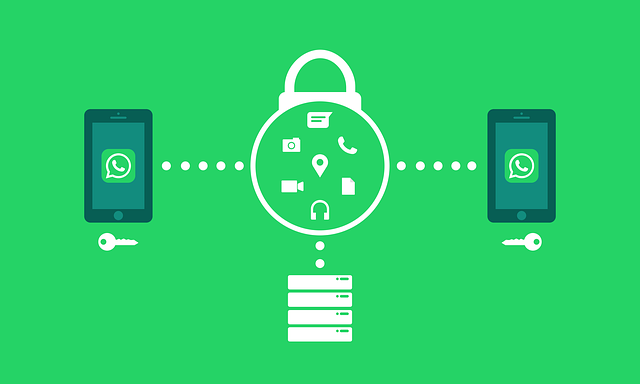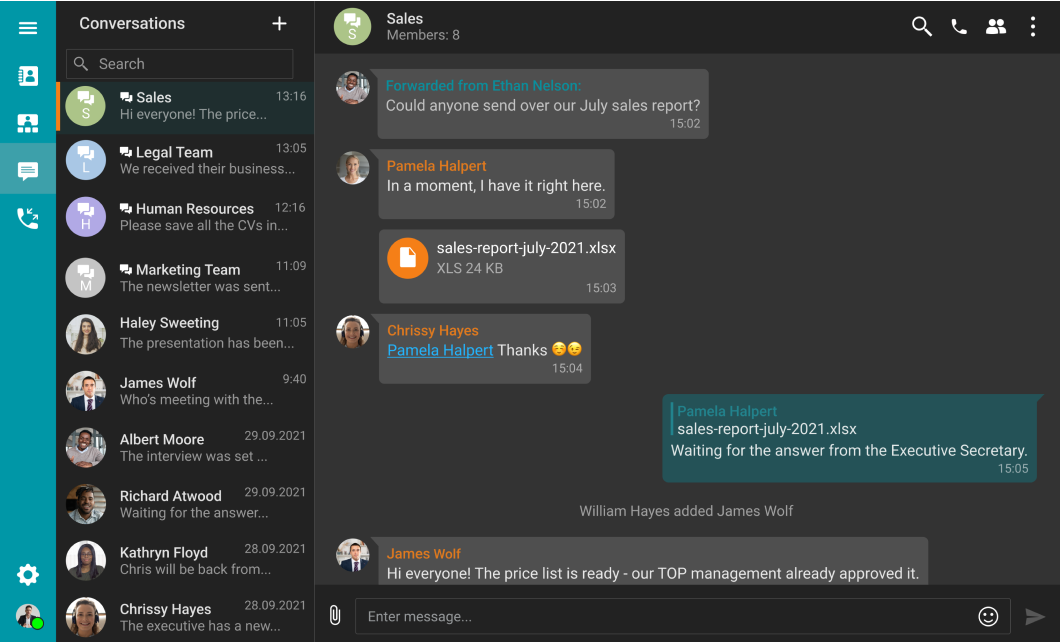How Secure Is WhatsApp?
Is WhatsApp safe?
Unfortunately, many WhatsApp users do not prioritize the security of the app, even though they trust it with not only data about their movements but also sensitive information such as bank cards and finances. Let’s begin by examining the security features and Security Certification that the developers claim are already integrated into the solution.
End-to-end encryption is one of the most important methods for ensuring user safety on WhatsApp. The main principle is to create a unique key that enables data decryption, with only the sender and recipient having access to it.

To check if end-to-end encryption is enabled, simply go to the chat section that corresponds to it. This method of ensuring user safety is highly effective because intercepted information cannot be identified by intruders. That is why most modern secure messengers precisely work on the basis of end-to-end encryption, utilizing the Signal protocol.
Another effective way to protect the privacy of interactions implemented in WhatsApp is two-factor authentication. This method involves the requirement of a confirmation code, which is sent to your personal mobile phone number, in order to access the account.
According to the developers, WhatsApp users’ conversations are not listened to or recorded, ensuring their privacy is guaranteed. Even the app’s system administrators do not have access to them, as they are also protected by end-to-end encryption.
This additional layer of security prevents unauthorized users from accessing your personal data, ensuring its protection. By combining this with the use of proxies, you further safeguard your online presence, making it even harder for unauthorized entities to infiltrate your accounts. You can rest assured knowing that no one will be able to use your account without your knowledge, because you will receive an immediate notification as soon as any activity is detected.
Most Common WhatsApp Security Issues
Despite all the methods of ensuring user protection and privacy, WhatsApp is not as secure as it initially appears. Not only has the application been at the center of multiple leak scandals, but some peculiarities of its functioning still remain dangerous.
Unencrypted Backups
As previously mentioned, WhatsApp utilizes end-to-end encryption during data transfer to protect your sensitive data and ensure secure communication. However, the information received on your device remains unprotected as it is stored in an unencrypted form.
There is a particular danger in the ability to create backups of chats, which is implemented on both Android and iOS. On the one hand, this feature can help users recover lost data if it was deleted.
However, you need to understand that, in this case, the information is stored in an unprotected form and can become the target of intruders. Your data may face additional risk if you use iCloud Backup or Google Drive to create a backup copy of your chats, alongside the local one.
Data Sharing
You may be surprised to find out that, despite the developers’ statements, WhatsApp collects a large amount of private data. The Privacy Policy of the application explains that the information is divided into three basic categories, including user-generated, automated, and third-party data.

The fact is, when communicating via WhatsApp, you automatically agree to provide not only information about your account. «Meta» has access to your phone number, as well as data on all the messages you send.
The company also receives information about your interests, hobbies, and field of activity from third-party applications and service providers that you use. Your bank cards and transactions are closely monitored, even if you have never discussed them with your interlocutor in chats, to help prevent identity theft.
As a result, «Meta» literally monitors your life constantly, and you have given the consent to this yourself. At the same time, it makes no sense to attempt to appeal to the current state of things with WhatsApp support.
Cheating via WhatsApp
Due to the large number of WhatsApp users, it has become one of the most popular targets for cybercriminals. To ensure security, App Store and Google Play Store carefully regulate the client applications available, so that visitors’ personal data does not fall into the hands of hackers. Nevertheless, the situation is completely different with the WhatsApp desktop application, causing natural concerns.
The fact is that there have already been cases where attackers have disguised malicious software as an add-on for a legitimate solution, containing a Trojan virus. This method was used to both damage the computer and obtain personal data, such as bank card and passport numbers.
Phishing websites, which trick users into sharing personal information, are still a frequent method of fraud. Most often, unsuspecting people who enter their phone number for authorization are the victims of spam bombardment. Utilizing insider threat analytics and a robust threat hunting solution can help identify potential internal risks and prevent misuse of sensitive customer information.
Hacking of accounts with subsequent extortion is also a frequent case of user deception. The attackers portray loved ones who have encountered an emergency situation in order to force them to transfer a certain amount of money.
Tips for Making Communication Safer
There are several effective ways to make WhatsApp much safer than with regular use, regardless of whether you use WhatsApp for daily communication or for marketing purposes. However, these tools will only work if you take precautions and carefully monitor any suspicious activity, as well as the software:
- When creating an account, make sure to create complex passwords that include not only letters, but also numbers and symbols;
- Make sure to enable two-factor authentication to decrease the likelihood of your personal account being hacked;
- Do not give your phone number to users you do not know personally or whose authenticity you are unsure of;
- Make sure to include the security code on your mobile phone to prevent anyone from using it remotely;
- It is important to regularly update WhatsApp, as developers continually work to fix any detected problems, including those related to security;
- Regardless of the device you choose, it is important to use antivirus software to protect yourself from malware;
- For enhanced privacy of communication sessions, it is highly recommended to enable a VPN;
- Only use the web version of WhatsApp in a browser that does not have password and bank card storage enabled.
It is important to remind you that it is necessary to block any interlocutors who are attempting to obtain your personal data. Pay special attention to users whose behavior changes dramatically – it is highly likely that their account has been hacked.
WhatsApp and Business Communication
A corporate communications solution should not only support simultaneous connections for a large number of users but also ensure secure interactions and prevent identity theft. If WhatsApp can still handle the number of participants, then the security issue becomes highly controversial.
Let’s closely examine the possibility of utilizing this application for corporate purposes.
Compliance with GDPR Requirements
In 2016, the European Union adopted the General Data Protection Regulation (GDPR), which regulates the approach to electronic privacy. At the same time, the fundamental criteria of this legal act not only state the obligation of service providers to specify the personal information that will be collected, but also the purposes for which it will be used.
As mentioned earlier, WhatsApp has faced repeated accusations of not prioritising the security of personal data. Not only is the official list of collected information quite vague, but users also have no way to choose what exactly the solution can gather.
This policy applies equally to both the free version of the platform and WhatsApp for Business. In order to continue communicating on the platform, users of the application must agree to these terms. As a result, WhatsApp’s approach contradicts the security requirements necessary for ensuring safe corporate communication and compliance.
Lack of User Management
WhatsApp is not suitable for managing large enterprises as it has a maximum group capacity of only 100 users. Changing a mobile phone number can lead to problems: it is necessary to remove the participant from all chats to prevent a third party from accessing corporate information.
In the case of WhatsApp, it can be extremely difficult to immediately restrict access to confidential information if an employee leaves the company. The reality is that some information will remain on the employee’s smartphone, and the group administrator has no control over it.
Mixing Work and Personal Life
WhatsApp remains one of the most popular apps for communicating with loved ones. However, adding business discussions to chats with family and friends can cause work to invade your personal life.
In such circumstances, it becomes virtually impossible to relax and distract oneself from professional affairs, as a rule. Many people who permanently combine work and home responsibilities often suffer from burnout for a long time.
Additionally, using a shared messenger can increase the likelihood of errors, which could potentially harm one’s reputation among colleagues. Sending a message to the wrong chat can jeopardize one’s career in some cases.
TrueConf: A Secure and Scalable Alternative to WhatsApp
TrueConf is a secure platform for corporate communication that offers a variety of features, including secure personal and group chats, video conferences, and tools for collaborating on tasks with teams. The solution is equipped with a multi-level security system that includes end-to-end encryption and operates within a closed network.

TrueConf fully complies with all GDPR requirements, ensuring secure and private interactions for companies of any size. The application works on almost all popular platforms, including iOS and Android, which means you can stay connected even during business trips.
About the Author
Nikita Dymenko is a technology writer and business development professional with more than six years of experience in the unified communications industry. Drawing on his background in product management, strategic growth, and business development at TrueConf, Nikita creates insightful articles and reviews about video conferencing platforms, collaboration tools, and enterprise messaging solutions.



Follow us on social networks